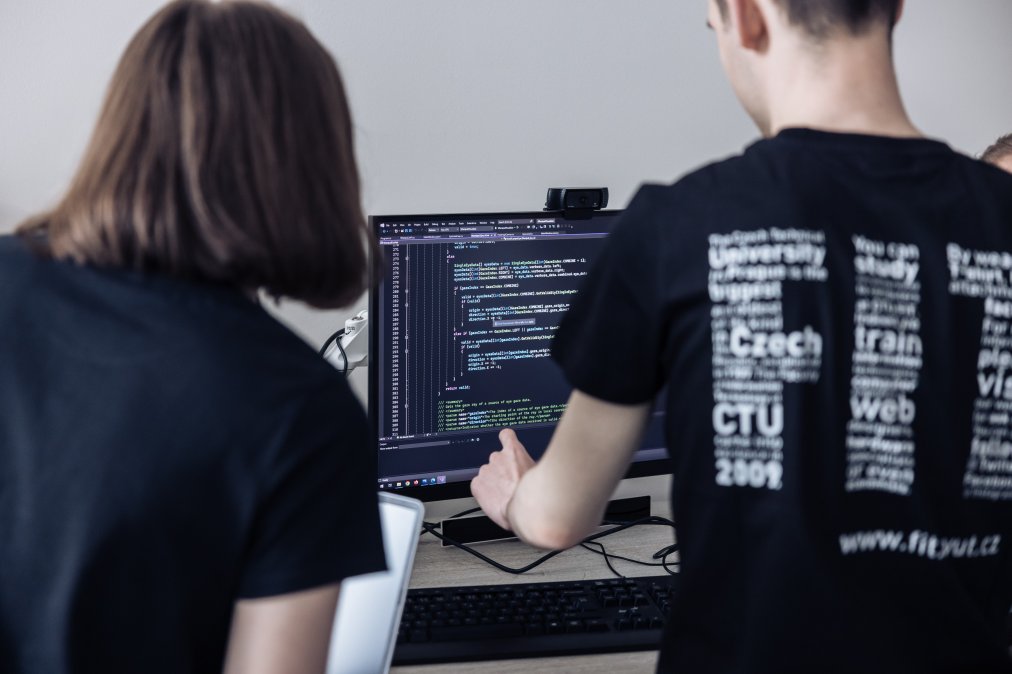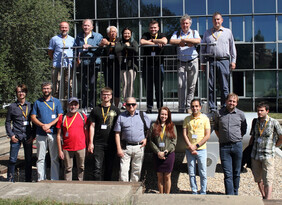
FIT CTU regularly innovates its teaching, and this includes not only updating existing courses but also expanding them with new ones. The winter semester of the upcoming academic year 2023/2024 is bringing 11 new elective courses to the students of the faculty. New students in the bachelor’s or master’s degree programme will indeed find something for themselves.
Unfortunately, three of the courses are taught only in Czech: Quality Assurance (BI-QUA), New Media in Art and Design (NI-NMU), and Machine Learning in Practice (NI-MLP). For the remaining eight courses, there is a variant for the English study programme, or they are conducted in English.
Marek Mika, a student and an editor of the faculty Buď FIT magazine, summarized details about the content of individual courses, their scope of teaching, credit evaluation and other interesting information about the new courses in his article. The following information is, therefore, an English translation of this article.
Introduction to Computer Science (BIE-CSI)
- The course website
- Type: bachelor, elective
- Number of credits: 2
- Range: 0 + 2
A wise man once said, “It is what it is.” The name of this new elective is indeed a catch-all in this case. It aims to introduce new bachelor’s students to the very basics of computer science and to set a common initial bar of knowledge for all. The course is taught partly in contact and partly online, and only in the winter semester. The course is led by prof. Christoph Kirsch. Those interested should ask their study officer to register it by email.
System Engineering (BIE-SEG)
- The course website
- Type: bachelor, elective
- Number of credits: 0
- Range: 0 + 2
Not sure whether to register for this course? Let’s do a quick quiz: processes, threads, emulation, virtualization, virtual memory, parallelism. Do you know these terms? And could you explain them to me clearly? If you are hesitant but have already covered the basics, you should not skip BIE-SEG! You will learn to work with concurrent computations to keep you up-to-date and avoid errors while accessing data. The course is led by prof. Christoph Kirsch.
Basics of System Security (BIE-ZSB.21)
- The course website
- Type: bachelor, elective
- Number of credits: 5
- Range: 2 + 2
The course aims to introduce students to the basic concepts of system security. The course also covers the fundamentals of forensic analysis and related topics of malware analysis and response to security incidents. Graduates of the course will gain theoretical and practical knowledge in the security of modern operating systems, as well as skills for independent work in the field of security incident analysis within the OS.
Applied Network Security (BIE-ASB.21)
- The course website
- Type: bachelor, elective
- Number of credits: 5
- Range: 2 + 2
It is a follow-up course elaborating on the practical application of the knowledge acquired in the BIE-PSI course. Students will learn about public key infrastructure, encrypted network protocols, link and network layer security, and wireless networks. Security issues are taught using examples of practical applications.
Grid Computing (NI-GRI)
- The course website
- Type: master, elective
- Number of credits: 5
- Range: 2 + 1
Just as it is useful to divide the preparation of exam questions in a group of students, calculations in the grid allow you to use all available computing resources. This ensures smooth operation and consistent outputs without overwhelming a supercomputer. The latter, after a few years, may not be so super anymore. However, there is nothing like distributing processes and processed data over the network between different computers that would otherwise lie fallow. “What moves, lives, what stands, rots,” said Tomáš Baťa, and he was right: data must flow, and fans must spin! We do not even have to go that far back in time for an example of use; during the pandemic, everyone could connect their device to a network that was trying to understand a new virus and find a vaccine. And remember the PS3? That little machine could not only run The Last of Us but also help doctors with the so-called folding of proteins as part of Stanford University’s Folding@Home project.
And now, students at FIT CTU can learn about this fantastic technology in the Grid Computing (NI-GRI) course under the Department of Computer Systems. The course is led by doc. Dr. André Sopczak from IEAP CTU, who has been working for a long time on large projects at CERN and has a unique experience with this type of computing infrastructure.
Advanced Program Testing (NIE-APT)
- The course website
- Type: master, elective
- Number of credits: 5
- Range: 2 + 1
As we know, we can never be sure that our programme is working correctly. But we should think of as many ways as possible to break it and then prepare it for such situations to at least give us more confidence in our approach. The goal of this new course is to introduce advanced techniques for testing programmes beyond writing unit tests so that students learn how to prevent threats when unexpected inputs occur. The course is led by Pierre Donat-Bouillud, Ph.D.
Practical Deep Learning (NIE-PDL)
- The course website
- Type: master, elective
- Number of credits: 5
- Range: 2 + 1
Deep learning is all around us with the popularization of AI. It is not only being talked about in research publications but quite possibly has dominated more than one conversation in your favourite opinion periodical or news website. NIE-PDL introduces students to this topic in more depth (it suggests itself) using the popular open-source machine learning tool – PyTorch. Students will try to develop and train neural networks on computer vision and natural language processing.
Personalized Machine Learning (NIE-PML)
- The course website
- Type: master, elective
- Number of credits: 5
- Range: 2 + 1
This is personal! Indeed, this subcategory of machine learning is responsible for, among other things, suspiciously accurate recommendations in the virtual world. It forms assumptions and models based on the collection of data related to unique subjects, individuals and type groups. However, the applications are much broader and more beneficial than they may first appear. For example, PML can be found in improving the quality of education based on an individual’s specific needs, in medicine and the general chemical industry. The course focuses mainly on breakthrough models that benefit both research and commercial society.



